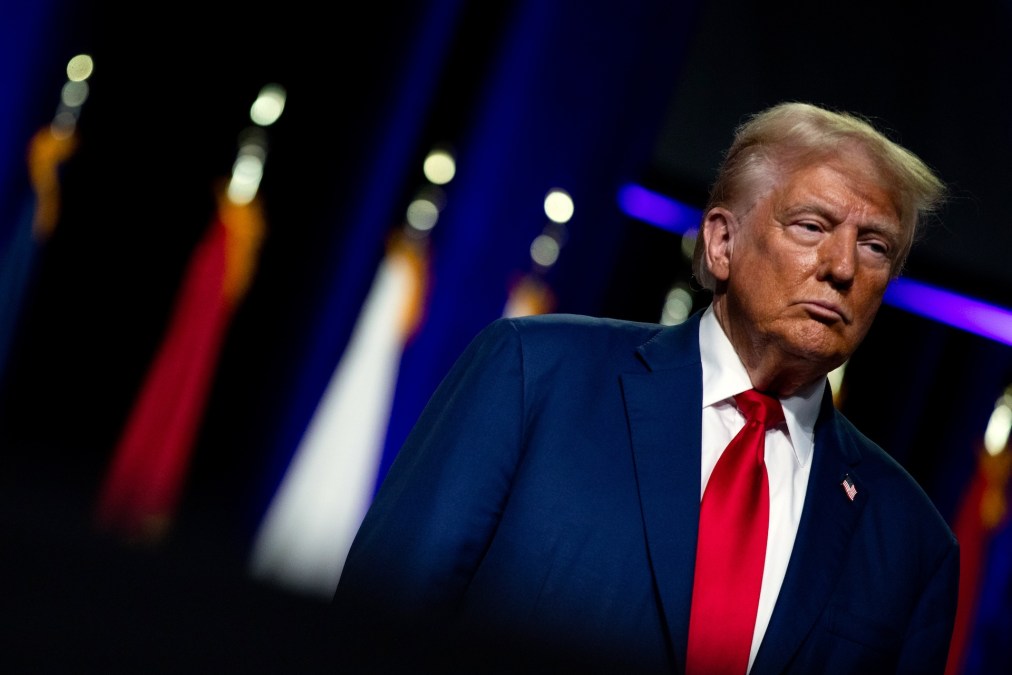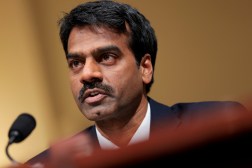Who would be the cyber pros in a second Trump term?

Working for Donald Trump during his term as president left a number of his top officials embittered.
The tumult sometimes trickled down among cybersecurity officials who served under him, with Trump famously firing the head of the Cybersecurity and Infrastructure Security Agency, Chris Krebs, and infighting on the National Security Council pushing some cyber officials aside.
Despite the past chaos, it’s clear from sources that CyberScoop spoke with both inside and outside the first Trump administration that he’ll have no lack of cybersecurity personnel willing or eager to enlist should he win election a second time, both among former officials and potential new pockets of previously untapped talent.
“There is a deep bench of Trump supporters in tech quietly preparing to support a second administration,” said Joshua Steinman, a former senior director for cyber policy at the NSC under Trump.
Trump only began assembling his transition team last month, chaired by former WWE CEO and Small Business Administration chief Linda McMahon, and Howard Lutnick, chairman and CEO of the financial services firm Cantor Fitzgerald. Last week he added former third-party presidential candidate Robert F. Kennedy Jr. and former Democratic congresswoman Tulsi Gabbard to the transition team.
No one CyberScoop spoke to among potential second-term Trump administration officials in the past two weeks said they’d had any discussions with the transition team, which is behind schedule for both Trump and his Democratic rival, Vice President Kamala Harris. And predicting what Trump might do is famously difficult, especially since his last transition in 2016 was upended completely at one point. One person familiar with cyber policy in Washington, D.C. expected transition team vetting work to begin in earnest this month or so, perhaps as soon as this week — just as the official voting season begins.
Nonetheless, sources brought up many of the same names among former Trump cyber officials believed to be candidates to rejoin.
Potential returning officials for a second Trump administration include:
- Pedro Allende, former Department of Homeland Security cyber official, now secretary of the Florida Department of Management Services;
- Nick Andersen, former White House and Energy Department cyber official, now with Invictus International Consulting;
- Michael Ellis, former NSC and National Security Agency official, who is now a fellow at the Heritage Foundation think tank;
- Karen Evans, former DHS chief information officer and Energy Department cyber lead, now managing director of the Cyber Readiness Institute;
- Brian Harrell, former CISA assistant secretary, now vice president and chief security officer with the Avangrid energy services company;
- Matt Hayden, former CISA assistant secretary, now vice president at General Dynamics Information Technology;
- Sam Kaplan, former DHS cyber official, now at Palo Alto Networks;
- Mike Klipstein, former NSC official, now an adviser at tech company SMX among other roles;
- Blake Moore, former Defense Department cyber official, now with Amazon Web Services;
- Lucian Niemeyer, former DOD official, now with the Building Cyber Security nonprofit;
- Sean Plankey, former NSC and Energy Department cyber official, now at the global cybersecurity advisory company WTW;
- Alexandra Seymour, former DOD and NSC official, now staff director of the House Homeland Security subcommittee on cyber;
- Steinman, who now serves as CEO of Galvanick, a cybersecurity company that specializes in industrial systems;
- Rob Strayer, former State Department cyber official, now president of the Critical Minerals Forum.
Andersen, Evans, Harrell, Klipstein and Plankey all told CyberScoop they’d be open and/or honored to serve again. Steinman said he was focused on helping Trump and that “discussions of staffing are best had the day after victory.” The others either couldn’t be reached or were otherwise unavailable for comment.
Additionally, “there are probably going to be some new faces in the game,” said one former Trump administration cyber official. The administration could draw from states with governors who supported the campaign, as well as candidates the campaign vetted for vice president or in tech circles among the campaign’s major donors, like those in the orbit of Elon Musk, the official said.
There are “quietly conservative or quietly Republican” tech professionals at places like Amazon or Facebook, as well as staffers working for Trump-supporting members of Congress, who could also emerge as future cyber executive branch officials, said the source familiar with cyber policy.
What’s noteworthy about some of the names circulating is that however “other stories have portrayed” potential second-term Trump administration officials, the names are “not a bunch of MAGA radicals,” the source said, even if they’ll have different ideas than the Biden-Harris administration cyber pros.
Project 2025, the policy blueprint for the second Trump administration written primarily by people with close ties to Trump, calls for more political appointees who serve the president’s agenda instead of “unelected bureaucrats.” Trump has sought to distance himself from the document.
Among potential returning Trump administration cyber officials, “everybody will be a bit more disciplined and more focused,” said one former such official. Many who worked on cyber under Trump didn’t “have a lot of years of government service. Not everybody was that way, but it was a unique experience for some of these guys,” the official said. “They’ll be a more disciplined operation on what works and what doesn’t — working with industry, state and local partners — rather than just technical smarts and technical prowess.”
There could also be changes to some of the biggest cyber jobs in the executive branch under Trump.
Project 2025 calls for scaling back CISA and moving it to the Transportation Department, following some GOP critiques that the agency’s election security mission has veered into censorship. Some Republicans in Congress have echoed that criticism.
Trump hasn’t had a chance to shape the Office of the National Cyber Director, created in a Defense Department policy bill that he vetoed at the end of his term before Congress overrode the veto.
“ONCD is going to run into some headaches” under Trump, a former Trump administration official said, because the lines of authority are so blurred and it was “being fought during the administration.” There needs to be a “unified team working together rather than working as individual leaders with individual missions,” the official said.
While several sources said there would be change at CISA in a second Trump administration, some view it as more of a shift than an overhaul.
“While CISA has been an easy target recently for Republicans due to their mis-dis-information campaign, a Trump Administration could reward funding for CISA to develop more robust threat detection and response capabilities, enhanced coordination with state and local governments, and greater support for initiatives aimed at protecting Industrial Control Systems (ICS),” Harrell said via email. “There may also be a focus on enhancing CISA’s public communications efforts to ensure timely dissemination of threat information and best practices to businesses and the general public.”
A former official under both Trump and Biden said that despite Project 2025’s language, whoever leads CISA will have a chance to convince Trump that the agency doesn’t need significant cuts. Any changes are likely to be “on the margins,” particularly since any reduction in the agency’s election security work won’t have a major impact on the overall CISA budget, the official said.
Overall, any Trump administration officials are going to bring their own “backgrounds and proclivities” to the work they do, the official said.
The Trump White House was more hands-off on cyber issues, allowing agencies to figure out how they wanted to go about the policy work with which they were tasked, the official said. The Biden White House, by contrast, has been “more tactically involved in what’s happening across agencies, a more significant degree of micromanagement,” said the official.
“The good news is that cyber isn’t a polarizing priority for either candidate,” said a former Trump administration official, meaning that there could be continuity on some of the work that agencies like CISA or the FBI have done, with the “pivot points” coming in regulatory approaches.
Said Harrell: “Cybersecurity policies under a Trump 2.0 will likely focus on removing redundant regulations, adding capabilities, and mitigating current and future threats from China, AI, and quantum computing.”
Cabinet-level positions with cyber responsibilities, such as secretary of defense or homeland security, have drawn their own speculation. House Homeland Security Chairman Mark Green, R-Tenn., is said to be interested in the DHS job, for instance, while Sen. Tom Cotton, R-Ark. and former Secretary of State Mike Pompeo are said to be in the mix for the Pentagon’s top position.
This story was updated Sept. 3, 2024, to clarify Brian Harrell’s current role.






